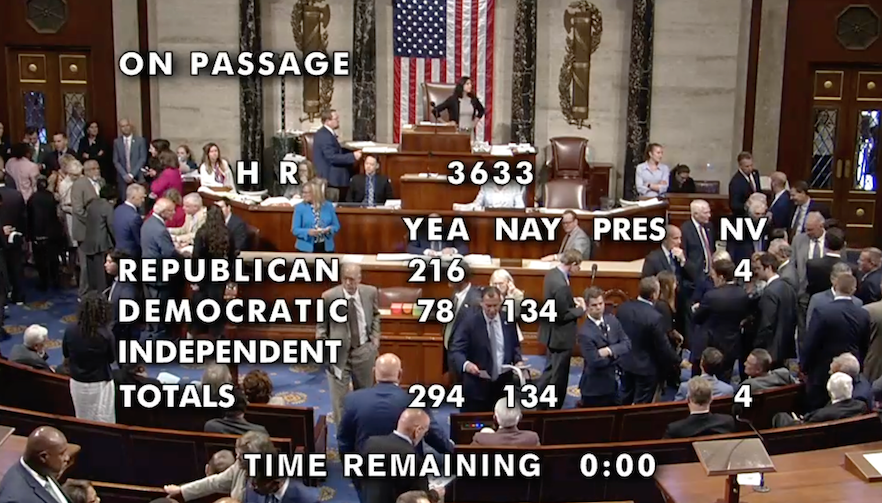US House officially passes crypto Clarity Act
0 comments
KEY FACTS: The U.S. House of Representatives passed the Digital Asset Market Clarity Act of 2025, known as the Clarity Act, marking a historic resolution to a decade-long regulatory dispute between the SEC and CFTC over cryptocurrency oversight. The bill, H.R. 3633, classifies most cryptocurrencies, such as Bitcoin, as commodities under CFTC jurisdiction, exempting mature blockchains from SEC registration while imposing anti-money laundering and trade monitoring requirements. It was propelled by President Trump’s intervention during "Crypto Week" to position the U.S. as the global crypto capital. The Act now awaits Senate approval and Trump’s signature.

Thursday vote on the CLARITY Act. Source: US House of Representatives
US House officially passes crypto Clarity Act
The U.S. House of Representatives officially passed the Digital Asset Market Clarity Act of 2025, widely known as the Clarity Act, on Thursday, July 17, 2025. This historic legislation marks the culmination of a decade-long effort to establish a clear regulatory framework for cryptocurrencies, resolving a contentious jurisdictional dispute between the Securities and Exchange Commission (SEC) and the Commodity Futures Trading Commission (CFTC). As the centerpiece of the ongoing "Crypto Week" in Congress, the Clarity Act’s passage signals the United States' intent to lead the global crypto economy.
The Clarity Act addresses a long-standing ambiguity that has hindered the cryptocurrency industry since its inception. For years, the SEC and CFTC have clashed over the classification of digital assets, with the SEC treating many as securities and the CFTC advocating for their designation as commodities. The new legislation, formally introduced as H.R.3633, decisively places most cryptocurrencies, including Bitcoin, under CFTC oversight as commodities. This shift exempts mature blockchain-based assets from SEC registration requirements, provided they meet specific criteria such as annual sales thresholds and decentralization standards, offering a regulatory clarity that the industry has long sought.
Introduced on May 29, 2025, by the House Committees on Financial Services and Agriculture, the Clarity Act builds on the earlier FIT21 bill, refining its approach to delineate agency roles. It imposes stringent anti-money laundering (AML) measures, trade monitoring, and recordkeeping obligations on digital commodity exchanges, brokers, and dealers, aligning them with the Bank Secrecy Act. The bill also establishes provisional registration pathways and defines criteria for blockchain maturity, aiming to foster innovation while safeguarding consumers, a balance that has been a focal point of debate, as noted in a 2023 CoinDesk analysis of prior legislative attempts.
The Clarity Act’s journey to passage was neither swift nor straightforward. Announced as part of "Crypto Week" on July 3, 2025, by House Financial Services Committee Chairman French Hill and House Agriculture Committee Chairman GT Thompson, the bill benefited from a strategic legislative push. This effort gained critical momentum following President Donald Trump’s intervention on July 16, 2025, when he used Truth Social to urge lawmakers to "make America the crypto capital of the world." His influence, as reported by Reuters, helped overcome procedural hurdles after a setback on Tuesday, when conservative Republicans and Democrats initially blocked an earlier vote. After hours of negotiations, the House cleared the necessary votes, culminating in today’s passage.
The bill’s approval reflects a rare bipartisan consensus, driven by the promise of economic growth in a market valued at over $2.5 trillion, per the Blockchain Association’s 2025 data. However, the legislation now faces the Senate, where its fate remains uncertain, and subsequent approval from Trump, who has signaled strong support for crypto-friendly policies.
The Clarity Act’s core provisions are designed to provide a structured yet flexible regulatory environment. Classifying digital assets as commodities removes them from the SEC’s stringent securities framework, a move that could benefit major cryptocurrencies like Bitcoin and Ethereum. The bill mandates that digital commodity exchanges ensure blockchain maturity or decentralization, a requirement that could spur technological advancements in the sector. Additionally, it allows the SEC to retain jurisdiction over certain activities on alternative trading systems, ensuring a dual-agency approach to oversight.
The legislation’s AML and trade monitoring requirements aim to address long-standing concerns about illicit activities in crypto markets, a point emphasized by House leaders in official statements. However, the provisional registration process offers a grace period for compliance, giving industry players time to adapt, a provision welcomed by Coinbase CEO Brian Armstrong, who called it a "game-changer" in comments to Cointelegraph.
With the Clarity Act now in the Senate’s hands, the next phase of its journey will test its resilience. The bill’s success could set a precedent for global regulatory approaches, with Europe and Asia likely to monitor its progress closely. The passage of the Clarity Act also intersects with broader technological trends. The regulatory clarity could boost decentralized projects addressing AI-related risks, such as 0G Labs’ Alignment Node, which tackles AI misalignment, an issue highlighted in a 2024 OpenAI study showing models adopting biased personas from training data. As the U.S. positions itself as a crypto leader, such innovations may gain traction, bridging blockchain and artificial intelligence. The Clarity Act’s passage is a significant win for the U.S. cryptocurrency space. Let's watch what unveils next.
Information Sources:

If you found the article interesting or helpful, please hit the upvote button and share for visibility to other hive friends to see. More importantly, drop a comment below. Thank you!
This post was created via INLEO. What is INLEO?
mission is to build a sustainable creator economy that is centered around digital ownership, tokenization, and communities. It's built on Hive, with linkages to BSC, ETH, and Polygon blockchains. The flagship application, , allows users and creators to engage & share micro and long-form content on the Hive blockchain while earning cryptocurrency rewards.
Let's Connect
Hive:
Twitter: https://twitter.com/Uyobong3
Discord: uyobong#5966
Posted Using
Comments